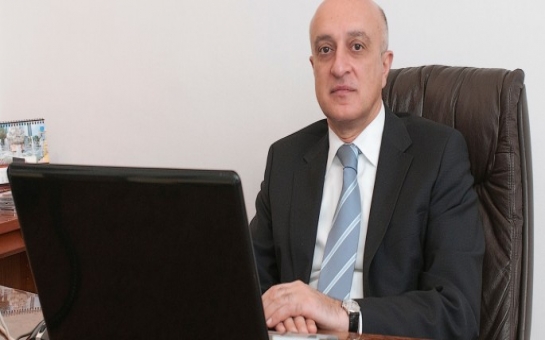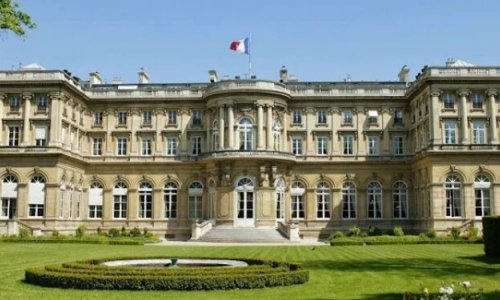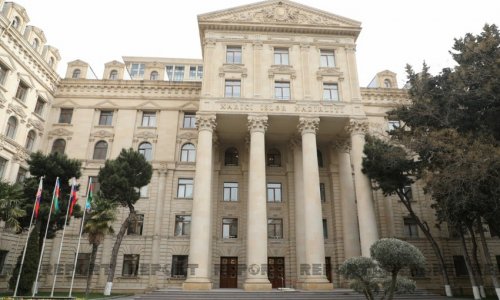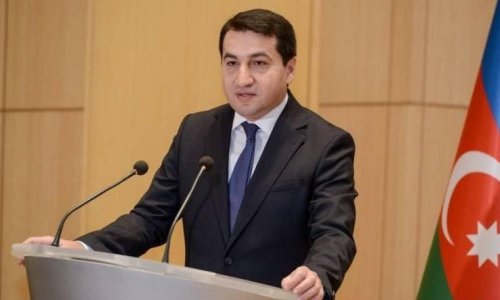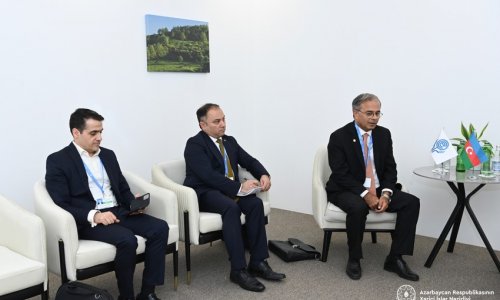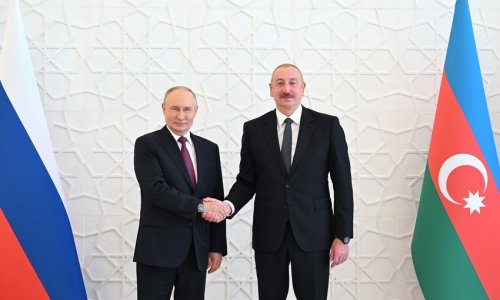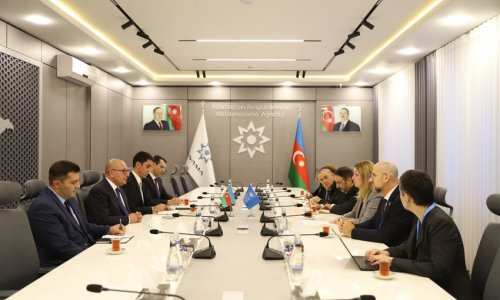London Post: How do you see the future of your country in the next five years?
Close observation of Azerbaijan’s recent achievements demonstrate the progress the country has made since its independence. Internationally, Azerbaijan continues to broaden its engagement and contributes to global agenda tackling current challenges. Undoubtedly, we will strengthen our participation in both regional and international organisations. Diplomatically, as the opening of new diplomatic missions in Africa, Latin America, Asia and Australia shows Azerbaijan will continue to expand the geography of its international representation.
Economically, the launch of a new landmark natural gas pipeline from the Caspian to Europe will enable Azerbaijan to get an access to the European energy markets and put the country strongly on the energy map of Europe. Meanwhile we take concrete steps to ensure national economy is well-diversified with gradual reduction of its dependence on one sector. The Government of Azerbaijan has prioritized agriculture, tourism, logistics, information technologies as key areas to diversify the economy away from energy sector and those sectors will receive growing investments over the next five years. Moreover, Azerbaijan enjoys huge tourism potential and with the completion of tourism development programs it will turn into an attractive tourism destination.
Azerbaijan will strengthen its unique role in promoting mutual understanding and respect among different faiths and civilizations. The country has demonstrated a successful model of harmonious and peaceful co-existence of faith groups and communities. The recent inter-cultural and inter-religious events such as Baku International Humanitarian Forum and World Forum on Inter-cultural Dialogue has turned Azerbaijan into a meeting place where members of various civilizations can meet and seek ways to address global challenges. I think this is a vital mission of our country and we shall strengthen our efforts to promote this environment of dialogue and harmony.
London Post: What kind of education policy your country has adopted keeping in view with the changes in science and technology?
Education in general is a priority sector for the Government of Azerbaijan as we undertake reforms to strengthen human resources of the country. Azerbaijan is the biggest investor in education in South Caucasus and that includes the application of ICT in education infrastructure with a view to creating information-based society. In fact the country’s National Strategy on ICT envisages measures to strengthen the application of information technologies in education sector. Joint projects are undertaken by the Ministry of Education in association with UNESCO, Microsoft Azerbaijan and local non-governmental organizations to strengthen the use and application of ICT in the education system. The introduction of ICT into education system is part of overall efforts to transform the national educational system. We work with international stakeholders such as UNESCO, ISESCO, UNICEF and EU’s TACIS/TEMPUS program and in 2005 Azerbaijan joined Bologna system that envisages the creation of uniform higher education area in Europe.
London Post: What measures have been taken to engage with the young people?
In Azerbaijan we recognize the vitality of sustained engagement with young people. The fact that some 30% of the total population is considered young requires the Government to adopt youth-friendly state policies. The Ministry of Youth and Sport of Azerbaijan is tasked with coordinating the activities of youth organizations. The Ministry works on the model of “working with and for young people” and currently oversees the implementation of State Program on Youth. The State Program aims to encourage the participation of youth in decision-making, deliver state support to youth organizations, exchange ideas and experience and governmental support to talented young people. February 2 is celebrated as “Day of Youth” and the Year 2007 was marked as the Year of Youth on the national level. The Ministry of Youth and Sport and some 300 youth organizations engage with their international partners as preparations are well underway to host Global Forum on Youth Policies in partnership with the UN Secretary-General’s Envoy for Youth in Baku in October 2014.
Azerbaijan promotes the realization of the potential of young people through participation in civil society organizations and NGOs. We also closely focus on promotion of young people to the government posts. There are many young people, men and women, holding important posts and contributing to the development of the country. We also acknowledge the increasing role and influence of the Internet and social media platforms in the lives of young people and the Government takes measures to ensure the Internet is accessible even in remote areas of the country.
London Post: What role Azerbaijan can play on international stage?
Azerbaijan has increased its international profile significantly over the last ten years and plays an active role on the international arena. Last December it concluded a two year non-permanent membership at the UN Security Council. In that capacity Azerbaijan stood for the preservation of fundamental principles of the current international and contributed to discussions to address global challenges. We hosted high level meetings on strengthening international cooperation in the fight against terrorism and the first ever meeting between the UN and the Organisation of Islamic Cooperation was initiated by Azerbaijan to explore avenues for a stronger cooperation and coordination between these two vital organisations.
Next month Azerbaijan is set to take over the chairmanship of the Council of Ministers of the Council of Europe. These two examples demonstrate ho broad range is the country’s international engagement. In fact, the country has transformed from a country on the brink of total collapse in early 1990s to a country keen and capable to take on more responsibilities. During early years of independence we faced an aggression from neighbouring Armenia and struggled to preserve and strengthen fragile statehood through critical reforms. It was a huge burden and serious challenge which required determination, statesmanlike and far-sighted vision for the future of the country. I am proud to say that the country has overcome this daunting task and now Azerbaijan is a trusted and well-esteemed member of international community.
Recently, Baku, the capital city has proudly hosted a range of international cultural, sporting events and inter-cultural forums. In May 2012 Baku hosted Eurovision Song Contest and in June 2015 we will organize the first ever European Games. The Annual Baku International Humanitarian Forum provides an excellent platform for the exchange of ideas and discussions on tackling global challenges bringing together Nobel laureats, renowned academicians, experts and decision-makers. Historically Azerbaijan has always been a meeting point of different cultures and civilizations and we take it as our responsibility to take the lead in strengthening dialogue and communication between faiths and cultures at such a tumultuous period for the future of inter-cultural relations.
These clearly have put the country on the map and looking ahead it seeks more active role on the global stage.
London Post: What Azerbaijan expects from cooperation with its neighbouring countries like Turkey, Georgia, Iran, Russia and Armenia?
Azerbaijan enjoys friendly relations with neighbouring countries based on mutual respect and beneficial cooperation. Except from Armenia, a country that has occupied twenty percent of the internationally-recognized territories of Azerbaijan, we have managed to establish strong political and commercial links with our partners in the region. The successful model of trilateral cooperation between Azerbaijan, Georgia and Turkey constitutes the cornerstone of regional development. These three countries set an exemplary model of how regional cooperation can bolster regional understanding and solidarity. The grandiose regional projects such as Baku-Tbilisi-Ceyhan oil and Baku-Tbilisi-Erzurum gas pipelines have indeed enhanced this cooperation and laid strong foundation to expand into other areas. The next phase of this regional cooperation is exploration of new areas such as infrastructure, tourism and ICT where Baku-Tbilisi-Kars regional railway will bolster the importance of the region as a logistics and transport hub connecting Europe and Asia.
Azerbaijan enjoys mutual understanding and cooperation with Iran and Russia on a range of regional and international issues. Both Russia and Iran are Azerbaijan’s strong trade partners and we share deep-rooted historic and cultural links with both countries. We believe that all regional countries stand to benefit from strong regional economic cooperation and concrete economic projects need to be undertaken to move regional cooperation into new levels. However, there are factors that obstruct the deepening of regional integration and economic cooperation.
The continuing occupation of Azerbaijani territories by Armenia remains as an obstacle for deepening regional cooperation and integration. Armenia refuses to abide by the UN Security Council Resolutions as well as decisions by other regional organizations such as the Organization of Islamic Cooperation and Council of Europe, all calling for the immediate and full withdrawal of Armenian armed forces from the occupied territories of Azerbaijan. The lack of political will and destructive approach in the negotiations process on the part of Armenia has stalled the mediation efforts held under the auspices of the OSCE’s Minsk Group since 1994. Therefore it is vital for the international community to build up pressure on Armenia to end the stalemate over the conflict and pave the way for a peaceful solution. The withdrawal of Armenian armed forces from the occupied territories of Azerbaijan would open up the way to reach a negotiated peaceful solution to the conflict and eventually bring peace and prosperity to the region.
London Post: How do you see your human resource development in next 5 years?
As I highlighted above Government of Azerbaijan prioritizes the policy of transforming its energy capital into human capital. This is one of the key areas the country’s strategic development concept entitled Azerbaijan: Vision 2020 focuses and sets out concrete objectives. In 2006 Azerbaijan initiated a landmark education program aiming to educate young talented Azerbaijani students in foreign universities abroad. Over the last seven years thousands of Azerbaijani students have had the opportunity to graduate from prestigious universities all around the world. In fact the UK is one of the most popular education destinations for them and I can proudly say that only in 2013 some 500 Azerbaijani students educate at British universities. The total number of Azerbaijani students at British universities is estimated to be around 2000.
Though some young, talented Azerbaijani professionals pursue successful careers across many sectors here in the UK, many others prefer to return to Azerbaijan to contribute to the development of the economy and this is an encouraging sign for the future of human resources in Azerbaijan.
Bakudaily.az

